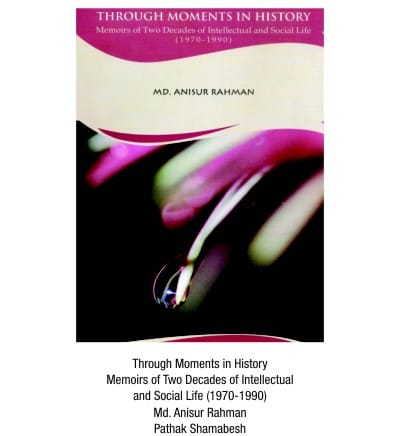Diary of an idealist

Idealists are a vanishing breed. I suppose every generation has lamented their demise, actual or merely perceived. Looking back on my own generation, I am inclined to believe that the tears are not without some merit. A fast-forward would not perhaps alter much. Vanishing or not, it is a rare breed and Md. Anisur Rahman , economist and ardent exponent of Rabindrasangeet, certainly belongs to it.
In Through Moments in History Anisur Rahman takes us from the tumultuous days of the War of Liberation to the end of the nineteen eighties. He has seen much, felt passionately about a great deal, and suffered frustration in equal measure. The present volume is, as he puts it, a memoir of two decades of his intellectual and social life.
The early pages of the book pack facts about the great economic divide between the two wings of Pakistan, the economic injustice suffered by the Bengalis, the rapid unraveling of the political situation in the late nineteen sixties, with the Awami League coming up with its six-point programme, and the role that some of the Bengali economists, Anisur Rahman among them, played in the formulation of the rationale for economic autonomy for the eastern wing.
Then suddenly March 1971 was upon the nation. Anisur Rahman the idealist found a place in the great awakening among the Bengalis, singing Brotochari songs in street marches, rousing people to "be a complete Bengali", something in which the reader might see a precursor of the author's later ideas and passions. On that terrible night of 25 March he and his family narrowly escaped death, while his colleagues were murdered by the Pakistani army. His escape to India was only a little less gripping. Helped by a number of devoted friends and patriots, he made his way to Agartala, but not before being manhandled by fellow Bengalis who would probably have lynched him as a suspected Pakistani spy, and was saved by the timely intervention of a group of students. The British novelist Robert Payne, in his 1977 novel, The Tortured And The Damned, retells the story.
The flight to Agartala was only the beginning of an odyssey that would take him to Delhi, and finally to the United States in May of that year. During the short few months he was at Harvard and Williams College, he agonised as much over the situation in Bangladesh as over that of his family, which finally joined him in exile. He used his academic connections in the Unites States in the best way he could, primarily lobbying US politicians for Bangladesh.
Anisur Rahman returned home briefly even before the country had been fully liberated. He felt he had to. In a few more weeks he was finally back home, eager to help in building a new nation. To him, the nation had to be built on the foundation, most importantly, of "egalitarianism", and "the creativity of the people." As a member of the newly created Bangladesh Planning Commission he felt it was his duty to work for that ideal. While not in doubt that the political realities in the country were hardly congenial to his ideas, he nevertheless went right ahead in propounding them wherever he could. There is a long list of action he wished taken. Here is a selection.
For a desperately poor country trying to emerge from the trauma of the War of Liberation, the need for austerity was immediate. Anisur Rahman proposed, among other things, to explore the formulation of an incomes policy in a committee that included not only the Finance Minister and political leaders but also student leaders who had participated in the war and representatives of the working class. He also proposed that most of the cars used for carrying government officers should be sold or exported. He personally urged Prime Minister Sheikh Mujibur Rahman to stop all displays of ostentatious consumption and launch an austerity programme that involved freedom fighters and dedicated youths from among the student community. He recalls ruefully that the Prime Minister fully agreed to his proposals on austerity, and then said to him, "But how do I do it?"
Anisur Rahman believed that the critical food situation in the country could be tacked and food self-sufficiency achieved within two years by use of the same dedication and patriotism that had led the people to victory in the War of Liberation. He enthusiastically supported the idea of village brigades to achieve it. But the idea remained only that, an idea. In a few months he was leading some of his students in participatory development programmes and, in one his projects, living in farmers' homes, planting rice, digging canals and doing a host of other things. He lived on the farm for only a few weeks on this occasion; his active commitment in the programme remained. His thinking continued to be dominated by participatory development at the local and national levels, to which formal planning by the likes of his Planning Commission was no substitute. He eagerly joined a number of local self-reliance movements, and came to love a village literacy programme initiated by the villagers themselves, which was a complete success. It pained him immensely when the latter success went unappreciated by mainstream political leaders and planners. And of course he was swiftly disenchanted when none of his ideas found any takers in the Planning Commission.
Idealism is not only ennobling; it is perhaps emboldening too. On a number of occasions his frustrations propelled Anisur Rahman to face the Father of the Nation himself with great insouciance. He was perhaps among a very few people in Bangladesh in 1972 to address Sheikh Mujibur Rahman, as "Sheikh Shaheb." And he spoke his mind, as some of these pages make clear, telling the leader what qualities of leadership the latter should have had and how he had failed as a leader.
Further disappointments awaited Anisur Rahman at the Department of Economics of Dacca University to which he returned from the Planning Commission. Since the constitution of the country enunciated socialism as a goal for the nation, he thought, rightly, there should be an academic course of study on socialism. Here too his efforts were stymied, by some devious means, he tells us. He tried to create a parallel department: Department of Theoretical Economics, without success. Finally he left for abroad but his idealism and his disdain of mainstream economics never left him. There was a period of flux, during which he continued to work on participatory, or alternative, development in a number of institutions, writing papers and giving seminars, for a time delving into the psychological aspects of development, a venture that must have tested heterodoxy to its limits.
Ever the idealist, he spurned several offers of financially attractive jobs. One such was a senior position at the United Nations Conference on Trade and Development (UNCTAD) which he declined because, in his own words, he "was committed to self-reliant development of countries of the south while UNCTAD wanted to kill self-reliance of southern countries with dependence-generating trade and aid…"."It was obvious to everyone", he continues, "that UNCTAD would not be able to buy my philosophy of self-reliant development." (p. 214). In 1978 he joined the International Labour Organisation (ILO) to develop a programme of "Participatory Organisations of the Rural Poor" (PORP). He devoted the next decade or so to the programme before returning home on early retirement.
This is an important book, though not an easy one to read, and not only because of poor editing. It is also laden with the author's frustrations over his ideas being unappreciated, rejected, even mocked, by those who he believed could make a difference to society. Yet his frustrations would be fully matched by exasperation on the part of many readers of the book. To some, this would be due in part to the encompassing egocentricity of the book that sometimes verges on the self-righteous. To others, exasperation would arise primarily from Anisur Rahman's total rejection of mainstream economics and conventional tools of economic development in favour of participatory development.
However imperfect these tools are, they are indispensable. On the highest stilts, to vary slightly a quote from Montaigne, you still need to walk on your legs. There are macroeconomic variables, thrown up by conventional economics, a development planner can ignore only at his peril. Total savings in the economy must be increased, investment must be nurtured, balance of payments has to be watched and exchange rates examined. Input-output coefficients, taught by Anisur Rahman the professor, and excoriated by him as member of the Planning Commission, remain a useful tool. A modern economy cannot develop simply by using a mantra of self-reliance. Neither is trade a Circe of dependency, as Anisur Rahman, and others, think.
Yet there is plenty in the book that most readers would easily relate to. His depiction of the lack of political leadership in the immediate post-independence years would be readily acceptable to many. And many would also empathise, as I would, with his humanity.

 For all latest news, follow The Daily Star's Google News channel.
For all latest news, follow The Daily Star's Google News channel. 



Comments